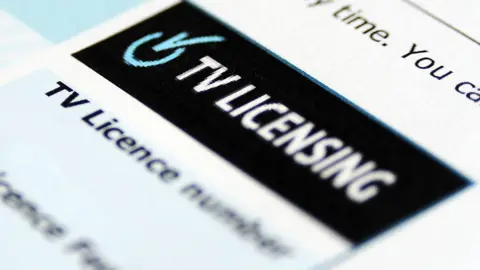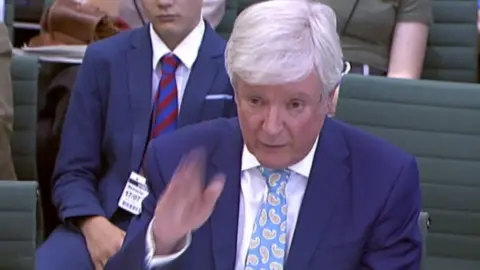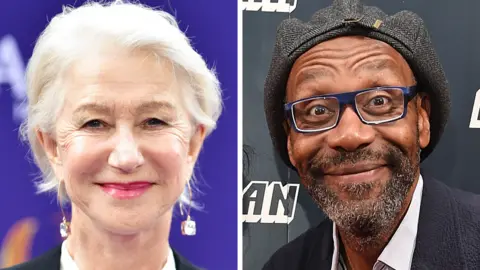Government's TV licence fee decision was 'nuclear', BBC boss says
 PA Media
PA MediaThe BBC's director general has claimed the Conservative government went "nuclear" by telling the corporation to take responsibility for free TV licences for over-75s.
The BBC announced last month that most over-75s would lose free licences.
The BBC took on the policy "really unwillingly" but had "no choice", Tony Hall told MPs on the House of Commons culture select committee.
The decision was made in negotiations with the government in 2015.
Lord Hall said the first he knew about the decision was when then-Culture Secretary John Whittingdale called him to say he had "lost the argument" and that the BBC would have to take over free TV licences for over-75s.
"At which point I said, 'Well, that's nuclear.' And I then laid out the consequences of that decision."
 AFP
AFPHe said he told the government at the time that the policy would need to be cut in some way, and that the government didn't seek a guarantee that it would be protected.
After a consultation, the BBC has now decided to revoke free TV licences for all over-75s, except those claiming the pension credit benefit. That has proved controversial, with more than 600,000 people signing a petition calling for the government to restore funding.
In a sometimes tetchy hearing, Conservative MP Julian Knight accused Lord Hall of "whingeing", suggesting he had misjudged his negotiations with politicians at the time.
The corporation won certain other agreements from the government - including an extended charter period, an increase in the licence fee, no longer paying for broadband roll-out, and plugging a loophole that meant people could watch the iPlayer without a TV licence.
Committee chairman Damian Collins, also a Conservative MP, suggested those deals were worth "about £700m", adding: "It seems you're net gainers from this process."
 Getty Images
Getty ImagesThe corporation has said keeping free licences for all over-75s would cost £745m, a fifth of the BBC's annual budget, by 2021/22.
Earlier on Wednesday, Dame Helen Mirren and Sir Lenny Henry were among a host of celebrities to sign an open letter calling on the next prime minister to go back to the pre-2015 set-up.
The Conservative Party included a pledge to continue free TV licences for over-75s in its manifesto for the 2017 general election - after power for the concession had passed to the BBC in law.
Lord Hall told MPs he wrote to the government after the election to ask "quite why the manifesto didn't reflect the powers that they had given to us, and I don't have a satisfactory answer".
He added: "It seemed, at best, odd to us that you had a manifesto commitment that was completely at odds with what the law had just determined was the case."
Licence fee negotiations should not happen at such speed behind closed doors in the future, Lord Hall said.
"I feel very, very strongly that this mustn't happen again," he said. "It happened in 2010 over a period of a few days, behind closed doors, and it happened again in 2015.
"I think when it comes to 2021, next time it's negotiated, it needs to be in plain sight with parliamentary involvement in a way that allows proper debate to take place."
A government statement said it was "very disappointed" with the BBC's decision to change licence fee arrangements.
"We've been clear that we want and expect the BBC to continue this concession," it said. "People across the country value television as a way to stay connected, and we want the BBC to look at further ways to support older people.
"Taxpayers want to see the BBC using its substantial licence fee income in an appropriate way to ensure it delivers for UK audiences, which includes showing restraint on salaries for senior staff."

Follow us on Facebook, on Twitter @BBCNewsEnts, or on Instagram at bbcnewsents. If you have a story suggestion email [email protected].
